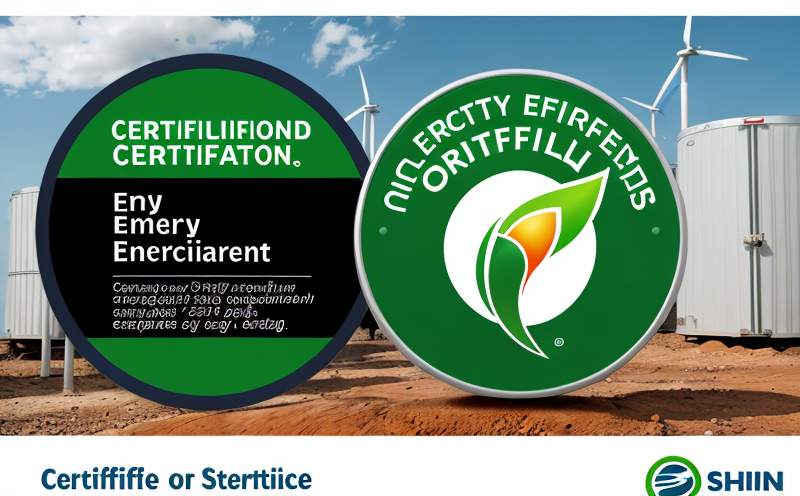Certification for Energy Efficiency and Storage: A Comprehensive Guide
In todays world, energy efficiency and storage have become crucial aspects of modern infrastructure development. As governments and organizations around the globe strive to reduce carbon emissions and mitigate climate change, the importance of certification programs in these fields cannot be overstated.
The demand for certified energy-efficient buildings, products, and services has been increasing significantly over the years, driven by growing consumer awareness and regulatory requirements. Certification programs provide a framework for manufacturers, building owners, and operators to demonstrate their commitment to reducing energy consumption and promoting sustainable development.
Understanding Energy Efficiency Certification
Energy efficiency certification programs are designed to recognize and reward entities that have implemented measures to reduce energy consumption without compromising performance or comfort. These programs typically involve a rigorous assessment process, which includes on-site audits, documentation reviews, and testing of energy-saving technologies.
Some of the key aspects of energy efficiency certification include:
Energy Audits: Comprehensive assessments of building energy usage patterns, identifying areas for improvement, and providing recommendations for energy-efficient upgrades.
Commissioning: Ensuring that installed systems, such as HVAC and lighting, operate according to design specifications and are properly maintained.
Testing and Verification: Measuring actual energy savings achieved through implemented measures, using tools like energy meters, thermographic cameras, and data loggers.
Understanding Energy Storage Certification
Energy storage certification programs focus on verifying the performance and safety of battery-based systems, ensuring they meet industry standards for quality, reliability, and efficiency. Some key aspects of energy storage certification include:
Battery Testing: Evaluating battery performance under various operating conditions, including charge/discharge cycles, depth of discharge, and temperature.
Safety Testing: Assessing the risk of fires, explosions, or electrical shock when handling or installing energy storage systems.
Performance Verification: Measuring actual energy capacity and charging/discharging efficiency to ensure compliance with manufacturer specifications.
Benefits of Certification for Energy Efficiency and Storage
Certification programs offer numerous benefits to entities seeking to demonstrate their commitment to energy efficiency and storage. These include:
1. Enhanced Credibility: Demonstrating a commitment to sustainability through certification can enhance an organizations reputation and build trust among stakeholders.
2. Increased Profits: Certified products or services often attract premium pricing, increasing revenue streams for manufacturers and service providers.
3. Reduced Costs: By optimizing energy consumption and improving system efficiency, certified entities can reduce operational costs, minimizing waste and conserving resources.
QA Section
Q1: What is the primary benefit of certification programs in the energy sector?
A1: The primary benefit of certification programs is to demonstrate a commitment to sustainability and energy efficiency, enhancing an organizations reputation and credibility among stakeholders.
Q2: What are some of the key aspects of energy efficiency certification?
A2:
Energy Audits
Commissioning
Testing and Verification
Q3: How do energy storage certification programs verify battery performance?
A3: Energy storage certification programs evaluate battery performance through testing, including charge/discharge cycles, depth of discharge, and temperature.
Q4: What are the key aspects of safety testing in energy storage certification?
A4: Safety testing assesses the risk of fires, explosions, or electrical shock when handling or installing energy storage systems.
Q5: Can certification programs improve system efficiency and reduce operational costs?
A5: Yes, certified products or services often attract premium pricing, increasing revenue streams for manufacturers and service providers. Optimizing energy consumption can also minimize waste and conserve resources.
Q6: What are some of the industry standards for quality, reliability, and efficiency in energy storage systems?
A6:
IEEE 1547 (Energy Storage Systems)
IEC 62616 (Lithium-Ion Batteries)
Conclusion
Certification programs play a vital role in promoting energy efficiency and storage, driving innovation and adoption of sustainable technologies. By understanding the key aspects of certification, including on-site audits, testing, and verification, entities can demonstrate their commitment to reducing carbon emissions and mitigating climate change.
In addition to the benefits mentioned earlier, certification programs also enhance public awareness, stimulate market growth, and foster international cooperation in addressing global energy challenges.
As governments, organizations, and individuals increasingly prioritize sustainability, the importance of certification for energy efficiency and storage will only continue to grow.

































